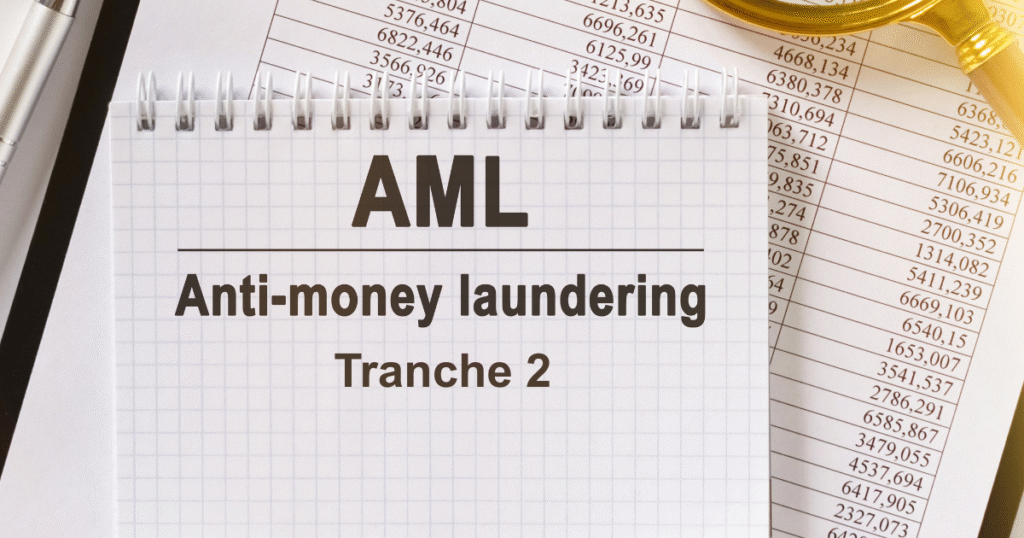Introduction
The Australian real estate industry faces a significant regulatory shift with the expansion of the anti-money laundering and counter-terrorism financing (AML/CTF) regime. Under these “Tranche 2” reforms to the Anti-Money Laundering and Counter-Terrorism Financing Act 2006 (Cth), real estate agents will be designated as reporting entities from 1 July 2026, introducing a new layer of compliance obligations to address the sector’s high risk for money laundering. Failure to adhere to these new laws can result in severe consequences, including multi-million dollar civil penalties, criminal charges, and other enforcement actions from the Australian Transaction Reports and Analysis Centre (AUSTRAC). This guide outlines the substantial financial and legal penalties real estate agents may face for a breach, highlighting the critical need for the real estate industry to prepare for these new responsibilities.
AUSTRAC Civil Penalties for AML Breaches
Maximum Fines for Corporations & Individuals
Under the Anti-Money Laundering and Counter-Terrorism Financing Act 2006 (Cth), AUSTRAC can seek substantial civil penalties through the Federal Court for serious or systemic non-compliance. The financial consequences of a breach are severe and apply to both real estate agencies as corporate bodies and individuals, such as directors or senior managers.
These penalties are calculated based on a system of penalty units, with the value of each unit determined by the Crimes Act 1914 (Cth).
The maximum civil penalties for a breach of the Anti-Money Laundering and Counter-Terrorism Financing Act 2006 (Cth) are:
| Entity Type | Maximum Civil Penalty |
|---|---|
| Corporations | Up to 100,000 penalty units ($33 million), applying to businesses like real estate agencies. |
| Individuals | Up to 20,000 penalty units ($6.6 million), ensuring personal accountability for key personnel. |
Daily Fines for Critical Compliance Failures
In addition to penalties for systemic breaches, AUSTRAC can impose infringement notices for specific administrative failures, which can result in significant daily fines.
A critical compliance failure for real estate agents is not enrolling with AUSTRAC by the deadline. The enrolment period for real estate professionals begins on 31 March 2026 and closes on 29 July 2026.
Failing to meet this deadline can trigger immediate financial penalties that accumulate for each day of non-compliance. The daily fines are:
| Entity Type | Maximum Daily Fine for Failure to Enrol |
|---|---|
| Business | Up to $19,800 per day |
| Individual | Up to $3,960 per day |
Get Your Free Initial Consultation
Request a Free Consultation with one of our experienced AML Lawyers today.
Criminal Penalties for Money Laundering in Real Estate
Penalties Under the Criminal Code Act 1995 (Cth)
Beyond the civil penalty regime administered by AUSTRAC, real estate agents directly involved in money laundering face severe criminal prosecution under the Criminal Code Act 1995 (Cth). These criminal offences are distinct from regulatory breaches and carry penalties that include substantial fines and lengthy terms of imprisonment.
The severity of the penalty depends on a tiered system that considers both the value of the money or property involved and the offender’s state of mind. The law establishes different fault elements, determining the offence’s seriousness and the corresponding punishment. These mental states include:
| Fault Element | Description |
|---|---|
| Intention | Dealing with money or property while believing it to be the proceeds of crime or intending to be used in criminal activity. |
| Recklessness | Proceeding with a transaction despite being aware of a substantial risk that the money or property is linked to a crime. |
| Negligence | Failing to exercise reasonable care to ensure that money or property is not the proceeds of crime. |
The penalties escalate significantly with the value of the illicit funds. For instance:
- Intentionally dealing with $10 million or more in proceeds of crime can result in a maximum penalty of life imprisonment.
- Even at lower thresholds, the consequences are severe, with negligent dealing of property worth over $1,000 carrying a potential 12-month prison sentence.
Determining Corporate & Individual Criminal Liability
Criminal liability for money laundering offences under the Criminal Code Act 1995 (Cth) applies to individuals, such as real estate agents and directors, and corporate bodies like real estate agencies. The legislation outlines specific principles for attributing a criminal fault element, such as intention or recklessness, to a corporation.
A company can be found criminally liable if it is proven that the offence was expressly, tacitly, or impliedly authorised or permitted by the organisation. This authorisation can be established by demonstrating that:
- The company’s board of directors or a high-level manager intentionally or recklessly engaged in the conduct or permitted the offence.
- The business failed to create and maintain a corporate culture that required compliance with anti-money laundering laws.
- There was inadequate corporate management or supervision of an employee or agent who committed the offence.
This means that an agency’s compliance culture is critical to determining liability. A failure to implement robust training, oversight, and internal controls can be interpreted as tacit permission for illegal conduct, thereby exposing the entire business to criminal prosecution.
Get Your Free Initial Consultation
Request a Free Consultation with one of our experienced AML Lawyers today.
Other AUSTRAC Enforcement Actions & Consequences
Enforceable Undertakings & Remedial Directions
AUSTRAC employs various enforcement tools beyond applying for civil penalty orders to ensure compliance with anti-money laundering and counter-terrorism financing laws. These actions can be disruptive and costly for a real estate business, even without multi-million-dollar fines. They are designed to compel reporting entities to rectify compliance failures and improve their internal processes.
AUSTRAC’s enforcement actions include several non-financial but legally binding measures:
| Enforcement Action | Description |
|---|---|
| Enforceable Undertakings | A written, public, and legally binding commitment from a business to AUSTRAC to fix specific compliance issues. Failure to adhere to the terms can lead to enforcement by the Federal Court. |
| Remedial Directions | A formal instruction from AUSTRAC directing a business to take specific actions to comply with the Anti-Money Laundering and Counter-Terrorism Financing Act 2006 (Cth). |
| Infringement Notices | An on-the-spot fine for less serious breaches related to specific obligations like reporting or record-keeping. |
| External Auditor Appointments | A business must appoint and pay for an external auditor to review its compliance program if risks are suspected. |
Reputational Damage & State-Level Licence Risk
A breach of anti-money laundering obligations can have severe consequences of federal penalties, significantly impacting a real estate agent’s professional standing and operating ability. Public enforcement actions by AUSTRAC can cause substantial reputational damage, eroding the trust of clients and the public, a critical asset in the real estate industry.
Moreover, a conviction for a financial crime, including dishonesty offences arising from money laundering activities, can lead to disqualification from holding a real estate licence under state and territory laws. State-level bodies such as NSW Fair Trading or Consumer Affairs Victoria may take action that effectively ends an agent’s career.
For example:
| State/Territory | Example of Licence Disqualification Rule |
|---|---|
| New South Wales | A conviction for an offence involving dishonesty within the last 10 years can disqualify a person from holding a licence. |
| Victoria | A conviction for a disqualifying offence, such as fraud, can lead to automatic licence cancellation for individuals and companies. |
Precedents from Major AUSTRAC Penalties
Although the Tranche 2 reforms have yet to take full effect in the real estate industry, AUSTRAC’s enforcement history in other regulated sectors clearly indicates its rigorous compliance approach.
The substantial civil penalties handed down to major Australian corporations are a powerful precedent, demonstrating the significant financial risks associated with breaching the Anti-Money Laundering and Counter-Terrorism Financing Act 2006 (Cth). These cases underscore the regulator’s willingness to pursue maximum penalties for systemic failures.
The scale of these penalties highlights what the real estate sector can now expect. High-profile enforcement actions against banks and casinos illustrate AUSTRAC’s commitment to holding reporting entities accountable for their anti-money laundering obligations.
Key examples of AUSTRAC’s civil penalty actions include:
| Corporation | Penalty | Year | Context of Breach |
|---|---|---|---|
| Westpac Banking Corporation | $1.3 billion | 2020 | Systemic non-compliance, including failure to report over 19 million international funds transfer instructions. |
| Commonwealth Bank of Australia (CBA) | $700 million | 2018 | Failure to report thousands of threshold transactions via intelligent deposit machines. |
| Crown Resorts | $450 million | 2023 | Widespread deficiencies in its AML/CTF program and customer due diligence processes. |
| SkyCity Adelaide | $67 million | 2024 | Systemic non-compliance with AML/CTF laws. |
Get Your Free Initial Consultation
Request a Free Consultation with one of our experienced AML Lawyers today.
Conclusion
From 1 July 2026, Australian real estate agents will face severe civil and criminal penalties for breaching anti-money laundering laws, including multi-million dollar fines and potential imprisonment. These risks are compounded by other AUSTRAC enforcement actions and the precedent of billion-dollar fines in different industries, underscoring the critical need for compliance.
To navigate these complex new responsibilities and safeguard your real estate agency, contact AML House today for specialised AML compliance services for real estate. Our AML compliance experts will ensure your real estate agency is fully prepared and protected.
Frequently Asked Questions (FAQs)
The maximum civil penalty for a corporation, such as a real estate agency, is up to $33 million for a serious breach of the Anti-Money Laundering and Counter-Terrorism Financing Act 2006 (Cth). This highlights the significant financial risk for businesses that fail to meet their compliance obligations.
Individuals can be personally liable for serious breaches of anti-money laundering laws. The maximum civil penalty for an individual can be up to $6.6 million, ensuring personal accountability for compliance failures.
The penalties can be severe if an agent is criminally convicted of money laundering under the Criminal Code Act 1995 (Cth). Punishment can include life imprisonment, depending on the value of the funds and the agent’s level of intent.
Failure to enrol with AUSTRAC by the required deadline can result in significant daily fines until the business is enrolled. These fines can be up to $19,800 for a company and $3,960 per day for an individual.
AUSTRAC can impose several other enforcement actions to ensure compliance with anti-money laundering laws. These measures include issuing infringement notices, accepting enforceable undertakings, giving remedial directions to fix compliance issues, and requiring the appointment of an external auditor at the agency’s expense.
Yes, a conviction for a dishonesty-related offence, which can arise from money laundering activities, may lead to disqualification from holding a real estate licence. This action would be taken under state and territory laws and could end your career.
A civil penalty is a monetary fine imposed by AUSTRAC for breaching regulatory obligations under the Anti-Money Laundering and Counter-Terrorism Financing Act 2006 (Cth). In contrast, a criminal penalty involves sanctions like imprisonment for committing a money laundering offence under the Criminal Code Act 1995 (Cth).
The substantial fines imposed on banks and casinos demonstrate AUSTRAC’s rigorous enforcement approach and willingness to seek maximum penalties for systemic non-compliance. These cases clearly warn of the scale of financial risk the real estate sector now faces under the new regulations.
Common failures that can trigger AUSTRAC enforcement include not having a documented and tailored AML/CTF program, failing to conduct proper customer due diligence, and not reporting suspicious matters. These foundational gaps in compliance are often the focus of regulatory scrutiny.








